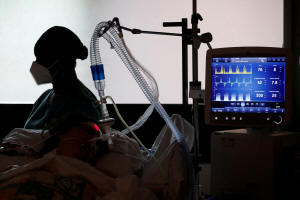Antibodies weak vs Omicron; treatment may help patients on ventilators
 Send a link to a friend
Send a link to a friend
 [December 18, 2021]
By Nancy Lapid [December 18, 2021]
By Nancy Lapid
(Reuters) - The following is a summary of
some recent studies on COVID-19. They include research that warrants
further study to corroborate the findings and that has yet to be
certified by peer review.
More evidence points to antibody weakness vs Omicron
Evidence emerging from lab experiments reveals weaknesses of vaccines
and antibody drugs against the Omicron variant of the coronavirus.
In a study reported Wednesday on bioRxiv ahead of peer review,
researchers at Columbia University found Omicron "to be markedly
resistant to neutralization" by antibodies in blood from recipients of
vaccines from Pfizer/BioNTech, Moderna, Johnson & Johnson or
Oxford/AstraZeneca or from survivors of COVID-19. Next, they tested nine
monoclonal antibodies that have been authorized for use and 10 that are
still experimental. Neutralizing abilities of 18 of the 19 antibodies
"were either abolished or impaired," including ones already authorized
for use, they said.

European researchers reported similar results in a separate paper, also
posted on Wednesday on bioRxiv. "Omicron was totally or partially
resistant to neutralization" by the nine monoclonal antibodies they
tested and by antibodies in blood samples from 90 vaccine recipients and
COVID-19 survivors.
Both teams also found that even in vaccine recipients who received a
booster dose, and in survivors who received vaccines, antibodies had
substantially diminished neutralizing power. In these individuals, the
European group said, neutralizing antibody levels were 5 to 31 times
lower against Omicron than against Delta.
More frequent treatment may help COVID-19 patients on ventilators
A new study considers why COVID-19 patients on mechanical ventilators
have trouble breathing and how refining a common treatment could help
save lives.
[to top of second column]
|

A COVID-19 patient connected to a ventilator tube in the Intensive
Care Unit (ICU) at the Centre Cardiologique du Nord private hospital
in Saint-Denis, near Paris, amid the coronavirus disease pandemic in
France, May 4, 2021. REUTERS/Benoit Tessier

A thin layer of fluid called pulmonary surfactant lines the air sacs
in the lungs, helping to keep the sacs from collapsing at the end of
each exhalation. Surfactant was first found to be important in
premature babies, who are born without enough surfactant.
The study, published this month in the American Journal of
Respiratory and Critical Care Medicine, shows for the first time
that COVID-19 patients on ventilators have less surfactant in their
lungs than healthy people.
When researchers treated 10 adult patients with the same artificial
surfactant used in preterm babies, the benefit of treatment wore off
very quickly and patients needed repeat doses far more often than
expected.
The virus that causes COVID-19 infects and kills the lung cells that
produce surfactant, but these cells will recover in time once the
infection is over, the researchers said. The new findings suggest
that in the meantime, "multiple surfactant doses over a number of
days will be required ... until the lungs start to make their own
surfactant."
(Reporting by Nancy Lapid and Christine Soares; Editing by Howard
Goller)
[© 2021 Thomson Reuters. All rights
reserved.] Copyright 2021 Reuters. All rights reserved. This material may not be published,
broadcast, rewritten or redistributed.
Thompson Reuters is solely responsible for this content.
 |